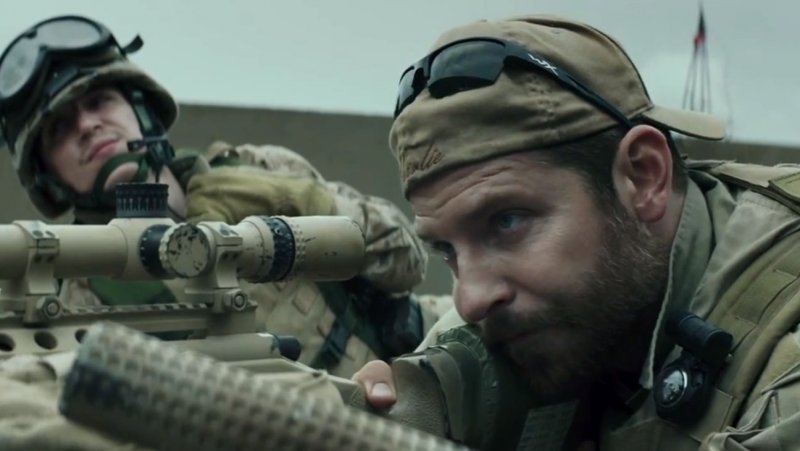
In the movies, and presumably in life, soldiers returning from war are haunted by horrible things they can’t unsee—things they’ve done, things they’ve witnessed. Often, they’re also traumatized by the cognitive dissonance of returning to mundane tasks after the extremity of combat. (This was famously illustrated by bomb defuser Jeremy Renner, nearly paralyzed as he contemplated rows of cereal boxes in the supermarket, in The Hurt Locker).
American Sniper, which is based on the autobiography of Navy SEAL Chris Kyle (Bradley Cooper), who served four tours of duty in Iraq, is a little different. Whenever Chris, considered to be the greatest military sniper of all time, comes home from the Gulf War II, he is restless and depressed and out-of-sorts. But this is not just because he’s traumatized by what he saw and did in Iraq. It’s also because he’s itching to get back. You see, he’s got more sniping to do.
Chris is an uncomplicated man—strong and brave and uniquely skilled with a gun (his father taught him how to hunt when he was a little boy). In his mind, the Iraqi soldiers are bad and the Americans are good. The trailer shows Chris agonizing over possibly having to kill a child, but the film makes it clear that he will also not hesitate to do so if that child has a bomb or automatic weapon that might jeopardize the safety of his men. He is 100 percent confident that he is saving the good guys and killing the bad ones. He’s also sure that when he’s not in Iraq, acting out his mission, good men will die.
What’s strange, and more than a little disconcerting about the film, is that director Clint Eastwood seems to agree with him—partly at least. The Iraqi militants are vilified here, in an almost propagandistic way. The child with that bomb? Armed by his militant mom. Later, another little boy is executed in cold blood by Iraqi soldiers (they thought his father was a traitor). Chris’s foil is an equally skilled Iraqi sniper who is treated as a stock bad guy, an inky doppelganger in the shadows. (We’re supposed to be as pumped up by Chris’s attempt to kill him as we might be watching James Bond go after a cartoonish villain.) To the film’s credit, there’s one character, a friend of Chris’s, who questions how gung ho everyone is. He points out that war is chaotic and murky and confusing—how can Chris be so sure of things? Chris can’t explain that. He just is. (Not incidentally, that friend ends up dead—a victim, according to Chris, of his own ambivalence.)
As Chris Kyle, Cooper gives a coiled, bruised, deeply internalized performance. He pumped up for the role—he actually seems to have changed his body type—and he sports an unfussy beard. When he talks, which is rarely, it’s in a gruff baritone. Early in the film, before he leaves for the Gulf, Chris is shown to have a jock’s swagger and confidence (he was a rodeo rider until 9/11 compelled him to enlist)—this is how he seduces his wife Taya (Sienna Miller). But as the film goes on, he gets more quiet, more cautious, more edgy. Military service has scarred him this way—he’s always on the lookout for potential threats in his peripheral vision. (There are many things I begrudge about this film; Cooper’s Oscar nomination is not one of them.)
Taya sees him slipping away, but she’s helpless to do anything about it (Miller is just fine here, but she’s given the thankless role of “perpetually concerned and frustrated wife”). In one of the film’s more poignant moments, Chris comes home from one of his tours of duty and, instead of going straight home—to be with his children, his wife—he heads to a bar to be alone with his thoughts. What should be his sanctuary is just another strange land to him. He can no longer fake normalcy.
As a tense action thriller, American Sniper is undeniably effective. As a portrait of a man who can’t adjust to civilian life after combat, equally so. I just wish it didn’t treat the people we waged war against as “them.” If there’s one war that deserves a more nuanced treatment, it’s Gulf II. (It’s all the more stunning that it comes from a man who directed the compassionate Letters From Iwo Jima.) It’s almost as if, in telling the story of Chris Kyle, Clint Eastwood actually turned into him.
